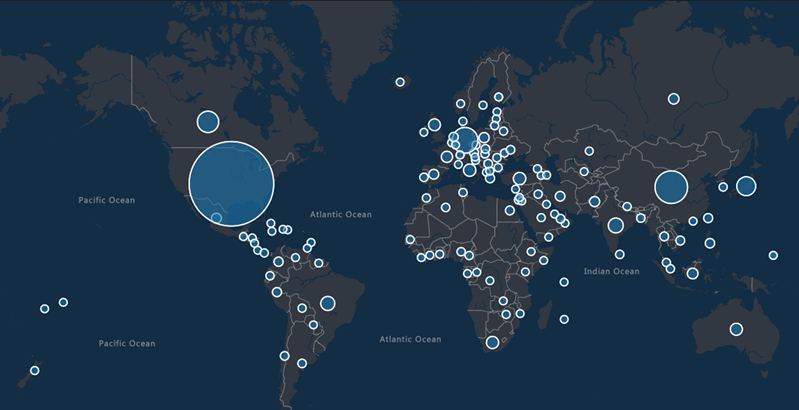US warns of government hackers targeting industrial control systems
"A joint cybersecurity advisory issued by CISA, NSA, FBI, and the Department of Energy (DOE) warns of government-backed hacking groups being able to hijack multiple industrial devices.
The federal agencies said the threat actors could use custom-built modular malware to scan for, compromise, and take control of industrial control system (ICS) and supervisory control and data acquisition (SCADA) devices.
"The APT actors' tools have a modular architecture and enable cyber actors to conduct highly automated exploits against targeted devices. Modules interact with targeted devices, enabling operations by lower-skilled cyber actors to emulate higher-skilled actor capabilities," the joint advisory reads.
"The APT actors can leverage the modules to scan for targeted devices, conduct reconnaissance on device details, upload malicious configuration/code to the targeted device, back up or restore device contents, and modify device parameters."
ICS/SCADA devices at risk of being compromised and hijacked include:
- Schneider Electric MODICON and MODICON Nano programmable logic controllers (PLCs)
- Omron Sysmac NJ and NX PLCs, and
- Open Platform Communications Unified Architecture (OPC UA) servers
DOE, CISA, NSA, and the FBI also found that state-sponsored hackers also have malware that leverages CVE-2020-15368 exploits to target Windows systems with ASRock motherboards to execute malicious code and move laterally to and disrupt IT or OT environments.
New PIPEDREAM malware targeting ICS devices
While the federal agencies did not share any additional info on the hacking tools and malware mentioned in the advisory, Robert M. Lee, the co-founder and CEO of industrial cybersecurity firm Dragos, said the company has been tracking one of the malware strains as PIPEDREAM since its discovery in early 2022.
"Dragos has been analyzing this since early 2022 and working with our partners the best we can to make sure the community is aware," Lee said.
"PIPEDREAM is the seventh ever ICS specific malware. It's highly capable and worth paying attention to."
Dragos assesses with high confidence this was developed by a state actor with the intent on deploying it to disrupt key infrastructure sites.
— Robert M. Lee (@RobertMLee) April 13, 2022
The federal agencies recommend network defenders start taking measures to protect their industrial networks from attacks using these new capabilities and malicious tools.
They advise enforcing multifactor authentication (MFA) for remote access to ICS networks, changing default passwords to ICS/SCADA devices and systems, rotating passwords, and using OT monitoring solutions to detect malicious indicators and behaviors.
Additional mitigation measures can be found within today's advisory, with more information provided by CISA and the Department of Defense on blocking attacks targeting OT systems [PDF], layer network security via segmentation, and reducing exposure across industrial systems."
Related Articles:
US says Russian state hackers breached defense contractors
FBI warns of MFA flaw used by state hackers for lateral movement
CISA orders agencies to patch actively exploited Sophos firewall bug
FBI warns election officials of credential phishing attacks
CISA warns of attacks targeting Internet-connected UPS devices
Microsoft disrupts Zloader malware in global operation
"A months-long global operation led by Microsoft's Digital Crimes Unit (DCU) has taken down dozens of domains used as command-and-control (C2) servers by the notorious ZLoader botnet.
The court order obtained by Microsoft allowed it to sinkhole 65 hardcoded domains used by the ZLoader cybercrime gang to control the botnet and another 319 domains registered using the domain generation algorithm used to create fallback and backup communication channels.
"During our investigation, we identified one of the perpetrators behind the creation of a component used in the ZLoader botnet to distribute ransomware as Denis Malikov, who lives in the city of Simferopol on the Crimean Peninsula," explained Amy Hogan-Burney, the DCU General Manager.
"We chose to name an individual in connection with this case to make clear that cybercriminals will not be allowed to hide behind the anonymity of the internet to commit their crimes."
Multiple telecommunication providers and cybersecurity firms worldwide partnered with Microsoft's threat intel and security researchers throughout the investigative effort, including ESET, Black Lotus Labs (Lumen's threat intelligence arm), Palo Alto Networks' Unit 42, and Avast.
The Financial Services Information Sharing and Analysis Centers (FS-ISAC) and the Health Information Sharing and Analysis Center (H-ISAC) also contributed data and insights to help strengthen the legal case.

> Zloader (aka Terdot and DELoader) is a widely-known banking trojan first spotted back in August 2015 when deployed in attacks against several British financial companies' customers.
> Like Zeus Panda and Floki Bot, this malware is almost wholly based on the Zeus v2 trojan's source code leaked online over a decade ago.
The malware has been used to target banks worldwide, from Australia and Brazil to North America, with the end goal of harvesting financial data via web injections that use social engineering to trick infected bank customers into handing out authentication codes and credentials.
Zloader also features backdoor and remote access capabilities, and it can be used as a malware loader to drop additional payloads on infected devices.
More recently, operators of multiple ransomware gangs have also used it to deploy malicious payloads such as Ryuk and Egregor.
Reports from ESET and the Microsoft 365 Defender Threat Intelligence Team provide indicators of compromise and further info on defense techniques and ZLoader's attack chains."
Related Articles:
Microsoft: Ukraine hit with FoxBlade malware hours before invasion
New EnemyBot DDoS botnet recruits routers and IoTs into its army
Microsoft April 2022 Patch Tuesday fixes 119 flaws, 2 zero-days
Microsoft: Windows Server now supports automatic .NET updates

Critical Apache Struts RCE vulnerability wasn't fully fixed, patch now
"Apache has fixed a critical vulnerability in its vastly popular Struts project that was previously believed to have been resolved but, as it turns out, wasn't fully remedied. As such, CISA is urging users and administrators to upgrade to the latest, patched Struts 2 versions."
- April 13, 2022
- 10:35 AM
 0
0
YESTERDAY
Ethereum dev imprisoned for helping North Korea evade sanctions
"Virgil Griffith, a US cryptocurrency expert, was sentenced on Tuesday to 63 months in prison after pleading guilty to assisting the Democratic People's Republic of Korea (DPRK) with technical info on how to evade sanctions."
- April 12, 2022
- 05:42 PM
 0
0





No comments:
Post a Comment